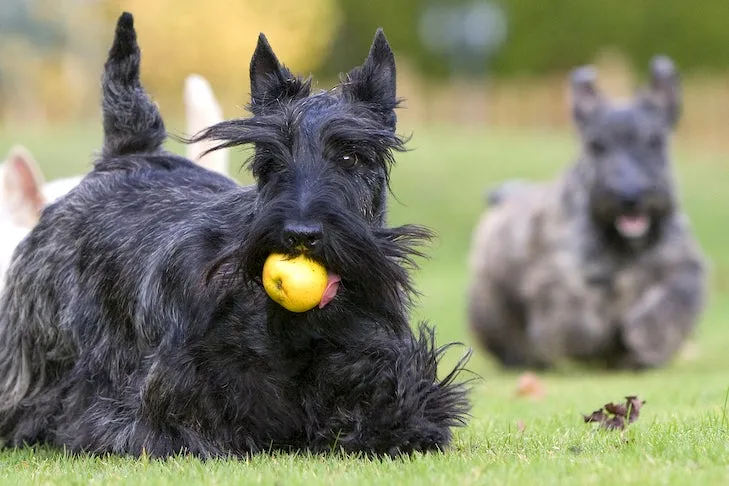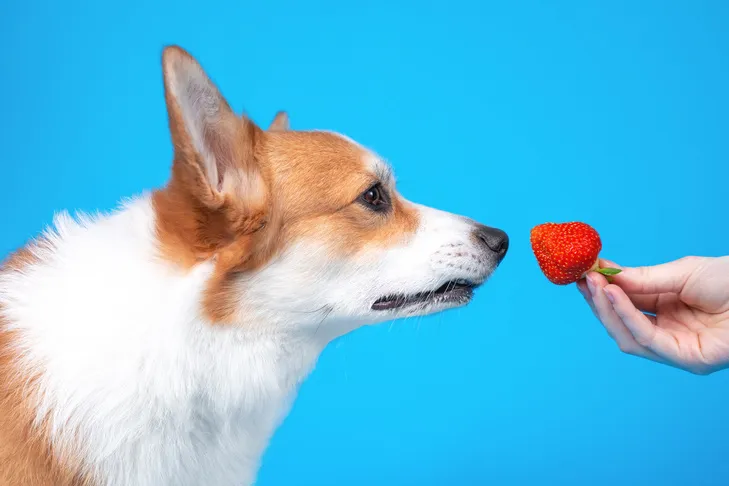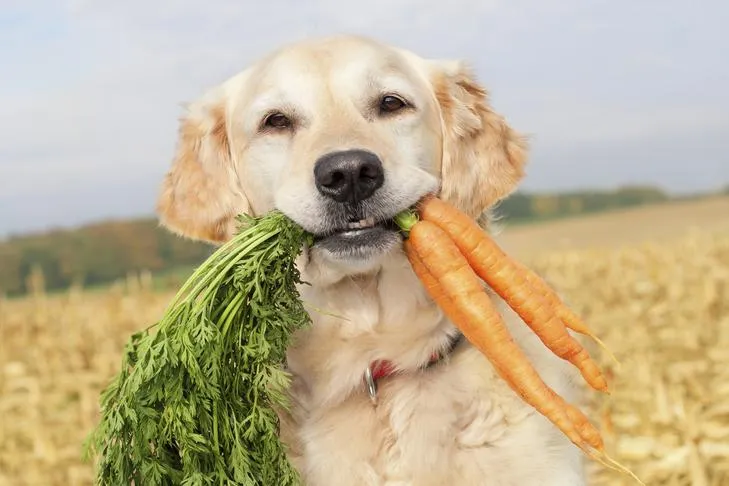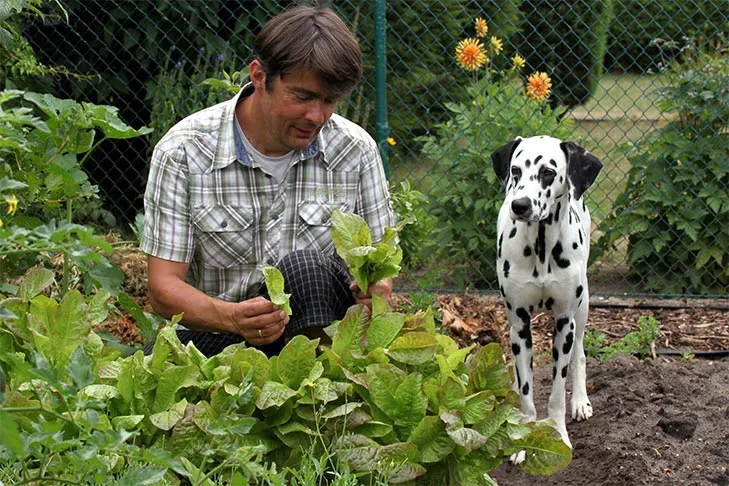As loving pet parents, it’s natural to want to share your favorite treats with your furry companion. But when it comes to human foods, especially fruits, it’s crucial to understand that what’s safe for you isn’t always safe for your dog. Dogs digest food differently than humans, and offering the wrong fruit can lead to serious health issues, and in extreme cases, even be fatal. While many foods dogs can eat and cannot eat are safe, some are downright dangerous, making it essential to know What Fruits Dogs Can Not Eat.
Dogs, as omnivores, don’t strictly require fruits or vegetables in their diet. However, certain dog-safe fruits and vegetables can be excellent, healthy treats or snacks when given in moderation. This comprehensive guide will help you navigate the world of fruits, identifying which ones are acceptable to share and which should be strictly avoided to ensure your canine friend’s safety and well-being. Understanding these distinctions is a vital part of responsible pet ownership.
Fruits Dogs Can Enjoy Safely
When given in moderation, many fruits can serve as delicious and nutritious treats for dogs, offering valuable vitamins, minerals, and antioxidants. These dog-friendly options are perfect for an occasional snack.
Apples
Apples are an excellent source of vitamins A and C, along with fiber, making them a beneficial snack for your dog. Their low protein and fat content make them an ideal treat, especially for senior dogs. Always remember to remove the seeds and core before offering apples, as the seeds contain traces of cyanide. For a refreshing warm-weather treat, consider freezing apple slices.
 Scottish Terriers playing in the grass.
Scottish Terriers playing in the grass.
Bananas
Bananas are a fantastic low-calorie treat for dogs when given sparingly. They are rich in potassium, various vitamins, biotin, fiber, and copper, while also being low in cholesterol and sodium. However, due to their high sugar content, bananas should be reserved as an occasional treat rather than a regular part of your dog’s main diet.
Blueberries
Often considered a superfood, blueberries are packed with antioxidants that protect cells from damage in both humans and canines. They also provide a good source of fiber and phytochemicals. Blueberries can be a fun and healthy reward, especially when teaching your dog to catch treats.
Cantaloupe
Cantaloupe is a nutrient-dense, low-calorie fruit that provides excellent hydration and fiber. However, its high sugar content means it should be offered in moderation, particularly for dogs who are overweight or have diabetes. Freezing small balls or cubes of cantaloupe can create a refreshing enrichment snack for your dog during warmer months.
Cranberries
Both fresh and dried cranberries are safe for dogs in small quantities. Whether your dog will appreciate their tart taste is another matter! As with any treat, moderation is key, as an excess of cranberries can lead to an upset stomach. Be mindful that many dried cranberries intended for human consumption are sweetened, adding unnecessary sugar to your dog’s diet. Opt for unsweetened fresh or frozen cranberries if your dog enjoys the flavor.
Mango
This sweet, juicy tropical fruit is a powerhouse of vitamins A, B6, C, and E, along with potassium, beta-carotene, and alpha-carotene. As with most fruits containing a large seed, it’s vital to remove the hard pit first, as it contains small amounts of cyanide and poses a choking hazard. Mango is high in sugar, so use it as an occasional treat, particularly for dogs prone to weight gain.
Oranges
Veterinarians confirm that oranges are generally safe for dogs, though many dogs are naturally put off by strong citrus smells or tastes. Oranges offer an excellent source of vitamin C, potassium, and fiber. In small quantities, the juicy flesh can be a tasty treat. It’s recommended to remove the orange peel and any seeds, as the peel can be rough on their digestive systems and the oils may be off-putting.
Peaches
Small amounts of fresh or frozen, cut-up peaches are a good source of fiber and vitamin A. Crucially, the peach pit, like cherry pits, contains cyanide. Ensure you completely remove the flesh from the pit before offering it. Discard pits safely in a dog-proof receptacle. Canned peaches should be avoided due to their high sugar syrup content.
Pears
Pears are a beneficial snack, rich in copper, vitamins C and K, and fiber. When sharing pears with your dog, cut the flesh into bite-sized chunks and remove the pit and seeds, as they contain traces of cyanide. Avoid canned or jarred pears that come in sugary syrups, even those labeled “in their own juice.”
Pineapple
A few chunks of pineapple can be a sweet treat for dogs, provided the spiky outer peel and crown are removed. This tropical fruit is full of vitamins, minerals, and fiber. It also contains bromelain, an enzyme that aids in protein absorption for dogs. Again, steer clear of canned or packaged pineapple in sweetened syrups, as dogs do not need added sugars in their diets.
Pumpkin
Pure pumpkin is a highly healthy food for dogs, particularly known for its ability to relieve both diarrhea and constipation. It’s also packed with antioxidants. When buying canned pumpkin, always choose 100% pumpkin puree, or you can roast and peel fresh pumpkin yourself.
Raspberries
Raspberries are safe for dogs in moderation and contain beneficial antioxidants. They are low in sugar and calories but high in fiber, manganese, and vitamin C. Raspberries are especially good for senior dogs due to their anti-inflammatory properties, which can help with aging joints. However, raspberries contain small, naturally occurring amounts of xylitol, so limit your dog to no more than 8 ounces of fresh or frozen raspberries.
Strawberries
Strawberries are rich in fiber and vitamin C, and they contain an enzyme that can help whiten your dog’s teeth. Like all fruits, strawberries contain natural sugar, so offer them in moderation. Frozen strawberries make a fun enrichment treat.
 Pembroke Welsh Corgi sniffing at a strawberry on a blue background.
Pembroke Welsh Corgi sniffing at a strawberry on a blue background.
Watermelon
Dogs can eat watermelon, but it’s crucial to remove the rind and seeds first, as they can cause intestinal blockage. The flesh, however, is safe and full of vitamins A, B-6, and C, as well as potassium. Comprising 92% water, watermelon is an excellent way to keep your dog hydrated on hot summer days. Freezing chunks of seeded watermelon provides a refreshing enrichment treat.
What Fruits Can Dogs Not Eat? Avoid These Dangerous Options
While some fruits are perfectly healthy for humans, others contain compounds, seeds, or parts that are dangerous, if not toxic, to dogs. It is best to keep these specific fruits entirely out of your dog’s reach to ensure their safety and well-being. Knowing what foods can dogs can not eat is paramount for responsible pet ownership.
Avocado
Although avocado is a healthy snack for humans, it should never be given to dogs. The pit, skin, and leaves of avocados contain persin, a toxin that frequently causes vomiting and diarrhea in dogs. While the fleshy inside of the avocado fruit has less persin, it can still be too much for a dog’s system. Additionally, avocado flesh is high in fat, which can lead to gastrointestinal upset or contribute to serious conditions like pancreatitis if consumed in large quantities.
 Rottweiler laying down in the yard, its head tilted.
Rottweiler laying down in the yard, its head tilted.
Cherries
With the exception of the fleshy fruit around the seed, cherry plants contain cyanide and are toxic to dogs. Cyanide interferes with cellular oxygen transport, meaning your dog’s blood cells cannot get enough oxygen. If you have a cherry tree, ensure your dog doesn’t have access to fallen fruit. Should your dog consume whole cherries or cherry pits, watch for signs of cyanide poisoning, such as dilated pupils, difficulty breathing, and red gums, which constitute a veterinary emergency. Always dispose of cherry pits in a dog-proof trash can.
Grapes
If you suspect your dog has eaten grapes or raisins, contact your veterinarian immediately. Grapes and raisins are highly toxic to dogs, regardless of breed, sex, or age. Their consumption can lead to acute kidney failure. Always be extremely vigilant about this dangerous fruit, especially if children in your home eat grapes or raisins. Dispose of grapes or raisins securely, away from your dog’s reach. This is a critical item on any what foods can dogs not eat list.
Tomatoes
While the ripened flesh of a tomato is generally safe for dogs, the green parts of the tomato plant—including stems, leaves, and unripe tomatoes—contain a toxic substance called solanine. A dog would likely need to consume a large amount of the plant to become ill, but it’s safest to avoid tomatoes entirely. If your dog enjoys exploring the garden, prevent them from accessing tomato plants.
Vegetables Dogs Can Enjoy Safely
Understanding which vegetables are safe for your dog is just as important as knowing which fruits to avoid. Many vegetables offer substantial nutritional benefits for dogs. Here are some options you can confidently prepare and share with your canine companion.
Broccoli
Broccoli is safe for dogs in small amounts and is best offered as an occasional treat. It’s high in fiber and vitamin C and low in fat. However, broccoli florets contain isothiocyanates, which can cause mild to potentially severe gastric irritation in some dogs. Tough broccoli stalks have also been known to cause esophageal obstruction. If your dog enjoys broccoli, serving it cooked can help mitigate these issues.
Brussels Sprouts
Brussels sprouts are packed with nutrients and antioxidants beneficial for both humans and dogs. However, avoid overfeeding them to your dog, as they are notorious for causing significant gas.
Carrots
Carrots are an excellent low-calorie snack, rich in fiber and beta-carotene, which converts to vitamin A. Furthermore, the crunching action of eating this orange root vegetable is great for your dog’s teeth. Carrots are a common ingredient in many dog foods and treats.
 Golden Retriever holding carrots.
Golden Retriever holding carrots.
Celery
In addition to vitamins A, B, and C, celery contains nutrients that promote heart health and may even help fight cancer. An added bonus is that celery is known to help freshen doggy breath.
Green Beans
Whether chopped, steamed, raw, or canned (plain, without added salt), green beans are safe for dogs. They are full of essential vitamins and minerals, rich in fiber, and low in calories. For dogs, choose no-salt canned green beans or use frozen green beans as a fun enrichment snack.
Peas
Green peas, snow peas, sugar snap peas, and garden or English peas are all acceptable for dogs occasionally. Peas provide several vitamins, minerals, and are rich in protein and fiber. You can feed your dog fresh or frozen peas, but always avoid canned peas with added sodium.
Spinach
Dogs can eat spinach, though it’s not the top recommendation. Spinach is high in oxalic acid, which can hinder the body’s ability to absorb calcium and potentially lead to kidney damage. While a dog would likely need to consume a very large amount for this problem to arise, it might be best to opt for another vegetable.
 Dalmatian watching a man gardening and picking leaves.
Dalmatian watching a man gardening and picking leaves.
Vegetables Dogs Should Avoid
While many vegetables can be a healthy addition to a dog’s diet, certain types can be toxic or harmful. Here are some vegetables that should not be included in your dog’s diet.
Asparagus
Asparagus isn’t necessarily unsafe for dogs, but it offers little benefit. It’s too tough to be eaten raw, and by the time it’s cooked soft enough for dogs, much of its nutritional value is lost. If you’re looking to share a vegetable, there are many better, more nutritious choices available.
Mushrooms
Wild mushrooms can be highly toxic to dogs. While only a small percentage of the thousands of mushroom species are poisonous, those that are can cause severe illness or even death. Always consider wild mushrooms a strict no. Washed mushrooms purchased from a supermarket for human consumption are generally fine for dogs.
Onions (and other Allium plants)
Dogs should never eat onions. If you suspect your dog has consumed onions, leeks, or chives (all part of the Allium family), contact your veterinarian immediately. These plants are poisonous to most pets, particularly cats, and can cause your dog’s red blood cells to rupture, leading to vomiting, diarrhea, stomach pain, and nausea. Poisoning is more severe in Japanese breeds like Akitas and Shiba Inus, but all dogs are susceptible. Ensure children do not share foods containing onions with your dog, and secure leftovers where your dog cannot access them. For a complete list of dangerous foods, refer to our guide on what are foods that dogs cannot eat.
When it comes to feeding your dog, knowledge is truly power. By understanding which fruits and vegetables are safe and which are not, you can make informed decisions that protect your pet’s health. Always prioritize their safety and consult your veterinarian if you have any doubts or concerns about new foods. Your dog’s well-being depends on your careful choices.
